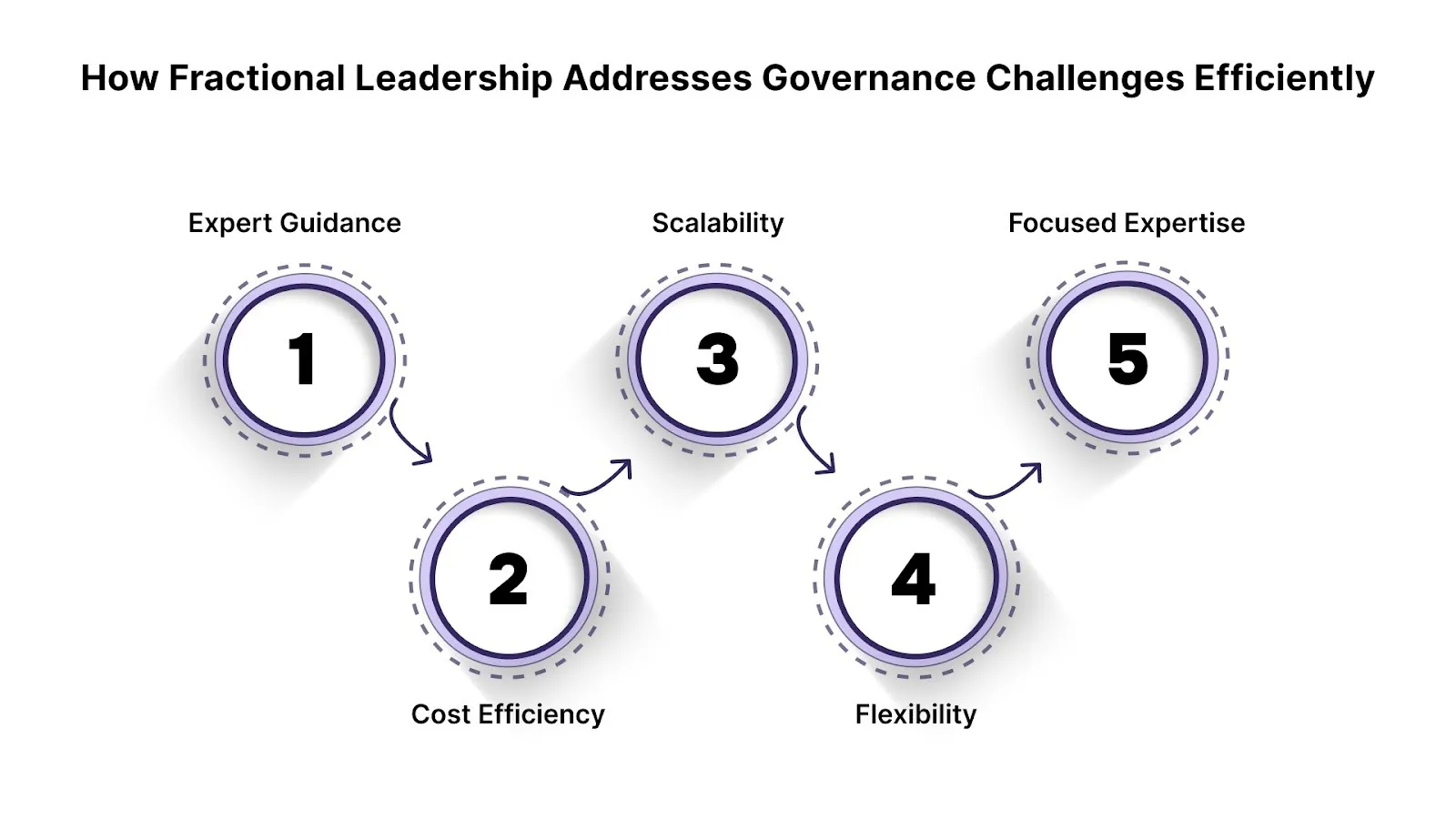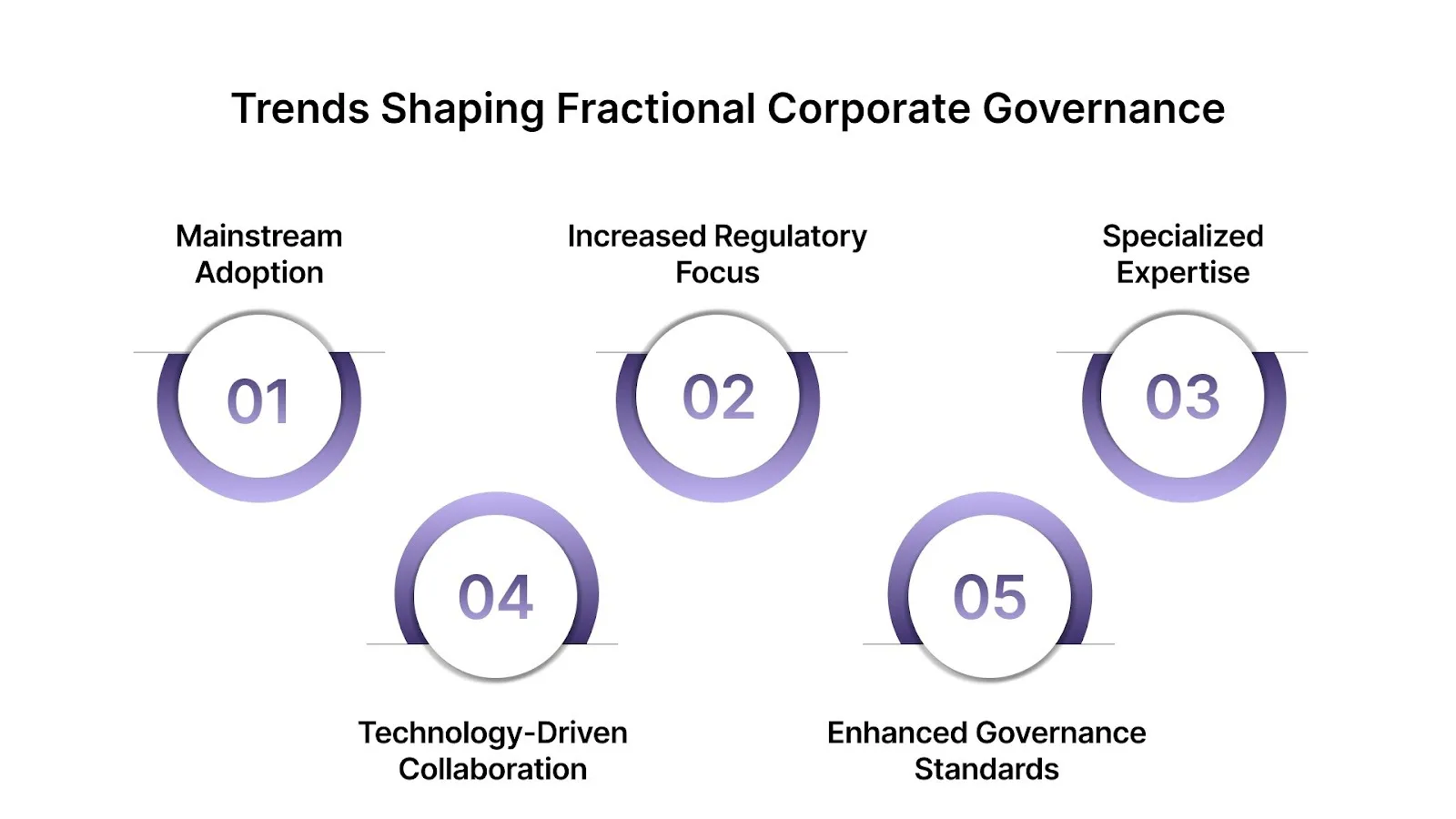Nov 13, 2025
How Fractional Leadership Transforms Corporate Governance

By Fraxtional LLC

Institutional investors now control nearly half (47%) of global market capitalization, driving changes in corporate governance and regulation. With rising investor influence, companies must adapt to complex compliance and reporting demands to maintain trust and avoid penalties.
For businesses and investors alike, navigating this complex terrain is no simple task. With ever-changing governance codes, increasing shareholder demands, and an escalating focus on sustainability, staying ahead of the curve has never been more critical.
In this blog, we’ll explore how fractional leadership offers a strategic solution to these challenges. We will discuss its role in corporate governance, industry-specific benefits, and how businesses can implement this model effectively.
TL;DR
- Regulatory Pressure: Businesses in FinTech, crypto, and banking face increasing compliance and reporting challenges.
- Flexible Leadership: Fractional leadership provides specialized expertise without the costs of full-time hires.
- Industry-Specific Needs: Fractional leaders cater to unique sector demands like AML, risk management, and ESG.
- Scalability: The model adapts to business growth, offering support that matches changing governance needs.
- Strategic Benefits: Enhanced compliance, risk management, and board oversight lead to improved organizational performance.
Top Issues Impacting Corporate Governance

Corporate governance faces growing challenges requiring urgent attention. Compliance, stakeholder expectations, and risk management are increasingly demanding. These issues are especially critical in sectors like FinTech, banking, crypto, and private equity, where regulations change frequently.
Key governance issues include:
- Regulatory Complexity: Increasing regulations make compliance a costly and challenging process, especially in FinTech and crypto. For example, 62% of DeFi platforms are estimated to be non-compliant.
- Cybersecurity Risks: As digital systems expand, businesses are vulnerable to data breaches, fraud, and system disruptions that can damage reputation and financial standing.
- ESG Integration: There is growing pressure to meet environmental, social, and governance (ESG) expectations, with many investors demanding sustainability in business practices.
- Stakeholder Expectations: Investors, customers, and regulators expect higher standards of transparency, ethical conduct, and responsiveness, putting more strain on governance frameworks.
- Board Effectiveness: Many companies struggle to form boards with the right expertise, leading to ineffective oversight and decision-making.
To better understand how these challenges manifest in different industries, the table below summarizes their specific impact across sectors.
Key Corporate Governance Challenges by Industry
These challenges require focused, expert leadership to address effectively, making it clear that fractional leadership can provide the expertise needed to overcome them.
How Fractional Leaders Tackle Governance Issues

Fractional leadership provides expert guidance on a flexible basis, helping companies address complex governance issues without the need for a full-time executive. This model allows businesses to access specialized knowledge when needed most.
How fractional leadership integrates into corporate governance:
- Expert Guidance: Fractional leaders bring specialized knowledge in areas such as anti-money laundering services or chief AML officer consulting services, ensuring businesses remain compliant with complex regulatory requirements.
- Cost Efficiency: Companies gain access to experienced executives without the financial burden of hiring full-time leaders.
- Scalability: Fractional leadership can be adjusted based on the company’s needs, ensuring leadership capacity grows as the organization does.
- Flexibility: Fractional executives work on a part-time or project basis, adapting to the company’s shifting requirements.
- Focused Expertise: With deep industry experience, fractional leaders provide targeted solutions to governance challenges across sectors.
Once you understand the value fractional leadership provides, it's crucial to choose the right engagement model that fits your company’s needs.
Types of Fractional Leadership Engagement
Fractional leadership offers several types of engagements, each tailored to specific business needs. These flexible models allow companies to choose the level of involvement and expertise required.
- Advisory: This is an ongoing arrangement, where a fractional leader provides consistent guidance, including policy and procedure development and independent audit services on a retainer basis.
- Subscription: Companies can engage fractional leaders for a fixed term with flexible hours, ideal for addressing specific issues as they arise.
- On-Demand: In this model, companies hire fractional leaders for specific projects or short-term needs, such as audits or risk assessments.
Now that we know the types of fractional leadership available, it’s time to explore the tangible impacts these leaders bring to organizations.
How Fractional Leadership Improves Corporate Governance

Fractional leadership improves corporate governance by offering specialized expertise that enhances compliance and reduces risk. It provides strategic oversight on a flexible basis, allowing businesses to address governance needs without full-time executives.
Here are the key impacts fractional leadership brings to governance:
- Enhanced Risk Management: Fractional leaders help organizations identify and address risks, ensuring they remain compliant and minimize potential financial and reputational damage.
- Improved Compliance: With deep regulatory knowledge, fractional leaders ensure companies stay ahead of regulatory requirements, avoiding penalties and maintaining a strong reputation.
- Cost-Effective Expertise: Companies gain access to top-tier leadership without the high costs associated with permanent executive hires, allowing for better resource allocation.
- Strategic Guidance: Fractional leaders offer high-level strategic oversight, ensuring that boards make informed decisions that align with long-term objectives.
- Flexibility and Scalability: Organizations can scale leadership support according to their specific needs, adapting to challenges as they arise without a full-time commitment.
The benefits of fractional leadership are clear, but its application varies across industries depending on the specific needs and challenges.
How Fractional Leadership Solves Industry-Specific Governance Challenges

Fractional leadership addresses specific challenges across industries, from managing regulations to mitigating risk and meeting stakeholder expectations. Below, we explore its key applications in various sectors.
- FinTech and Digital Assets
In FinTech, businesses face changing regulations and cybersecurity risks. Fractional leaders offer expertise in compliance, risk management, and digital security, helping businesses meet standards while protecting data and maintaining customer trust.
- Traditional Banking and Financial Services
Fractional leaders in banking and financial services focus on improving governance and ensuring compliance with regulatory standards. They provide expertise in risk assessment, fraud prevention, and ESG compliance, helping institutions strengthen controls and enhance transparency.
- Cryptocurrency and Digital Assets
The cryptocurrency market faces complex regulations across jurisdictions. Fractional leaders help companies comply with global requirements while ensuring security, transparency, and readiness for future challenges.
- Private Equity and Investment Firms
For private equity firms, fractional leadership provides expertise in governance, risk management, and compliance across portfolio companies. For example, fractional leaders assist with money transmitter licensing and sponsor bank partnership services to ensure regulatory compliance.
With fractional leadership successfully applied in various industries, it’s important to understand how to implement it effectively in your organization.
How to Integrate Fractional Leadership Into Your Governance

Implementing fractional leadership requires careful planning to ensure its success within an organization. Companies must clearly define expectations, set objectives, and establish strong communication channels.
Below are some key strategies for integrating fractional leadership effectively into corporate governance.
- Define Clear Objectives and Deliverables: Set specific goals for the fractional leader and outline key performance indicators (KPIs) to track their contributions and impact.
- Establish Authority and Decision-Making Power: Clearly define the fractional leader's authority, ensuring they have enough influence to make strategic decisions and drive change.
- Ensure Integration with Existing Teams: Fractional leaders should be embedded in the company's operations, collaborating with internal teams to drive alignment and achieve goals.
- Set Realistic Expectations: Understand that fractional leaders work on a part-time basis, so establish achievable goals that align with their availability and expertise.
- Encourage Knowledge Transfer: Ensure that the fractional leader shares their expertise with internal teams, empowering employees and building long-term governance capabilities.
Looking for cost-effective, expert leadership to address your governance and compliance needs? Let Fraxtional provide the specialized guidance you need. Contact us for a consultation!
Emerging Trends in Fractional Leadership for Governance

As regulatory demands rise, fractional leadership is becoming a standard governance model. Organizations will increasingly rely on fractional leaders to tackle specific challenges without full-time hires. The benefits of this approach are becoming more clear across industries.
Here are key trends shaping the future of fractional leadership in corporate governance:
- Mainstream Adoption: Fractional leadership is expected to become more common across both small and large businesses as companies realize its cost and expertise benefits.
- Increased Regulatory Focus: With stricter regulations, companies will rely more on fractional experts for interim MLRO executive services and SOC2 compliance to stay compliant and avoid penalties.
- Specialized Expertise: As business needs become more specific, fractional leadership will see growth in niche areas like cybersecurity, ESG, and financial compliance.
- Technology-Driven Collaboration: Advances in digital communication will enable fractional leaders to work more effectively across global teams, enhancing their impact on governance.
- Enhanced Governance Standards: As fractional leaders become more integrated, their influence will push organizations to improve their overall governance frameworks, creating higher standards across industries.
With these emerging trends in mind, fractional leadership offers a forward-thinking solution for governance challenges now and in the years to come.
Conclusion
Fractional leadership provides specialized expertise on a flexible basis, helping businesses meet regulatory demands, improve compliance, and strengthen governance without the cost of full-time executives. This model is especially valuable in industries requiring agile leadership for compliance.
If your business is ready to benefit from fractional leadership, consider exploring services such as fraxtional leadership services or interim CCO executive services to address your compliance and governance needs.
Explore your options today to strengthen your governance and position your business for future success.
FAQs
The three types are shareholder governance, focusing on shareholders' interests; stakeholder governance, considering all parties involved; and internal governance, managing internal structures and controls.
The seven pillars are accountability, transparency, fairness, responsibility, independence, ethical conduct, and sustainability, which guide companies toward responsible decision-making and performance.
Fractional leadership involves hiring experienced executives on a part-time or temporary basis to provide expertise without the cost of full-time hires.
The four levels are board governance, executive governance, regulatory governance, and stakeholder governance, which ensure balanced oversight and compliance across the organization.
Fractional leadership is popular because it provides companies with specialized expertise on a flexible, cost-effective basis to address specific governance and compliance challenges.
blogs
Don’t miss these
Let’s Get Started
Ready to Strengthen Your Compliance Program?
Take the next step towards expert compliance solutions. Connect with us today.




